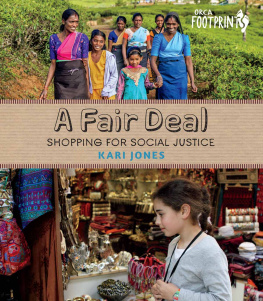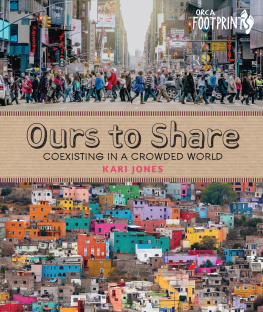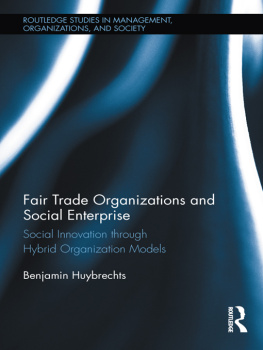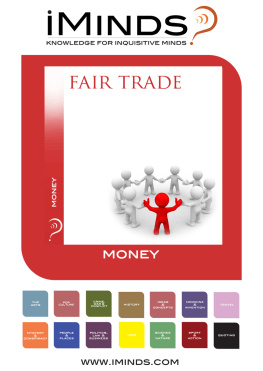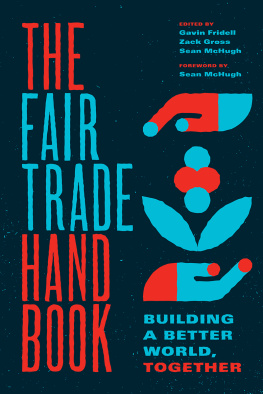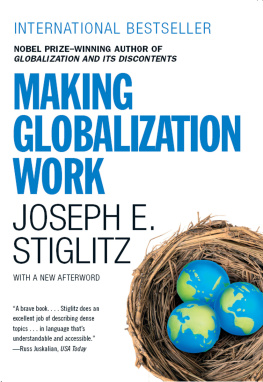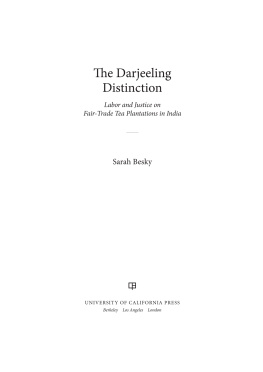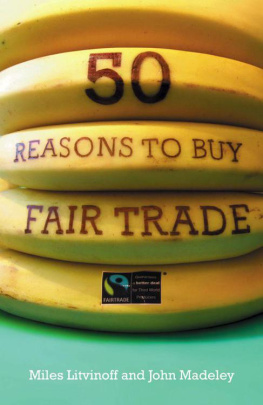Index
Page numbers in bold indicate an image; there may also be text related to the same topic on that page
Page numbers refer to print edition
Aberaeron, Wales,
Aleppo, Syria,
Andes, Colombia,
Antioquia, Colombia,
artisans,
Avery Jane,
awareness, of fair trade,
baking, with fair trade ingredients,
bananas, fair trade,
barter system,
baskets: handmade,
beauty products, fair trade,
Beijing, China, pollution,
Bolivia,
Brazil,
businesses,
buyers. See consumers
Byler, Edna Ruth,
cacao/cocoa, . See also chocolate
cafeterias, fair trade,
Cambodia,
camels, for transport,
Card, Addie, child laborer,
central hub,
child labor,
China: Beijing,
chocolate, . See also cacao/cocoa
chocolate challenge,
choices, choosing fair trade,
Christian missionaries,
Ciro, Hugo,
cloth, handmade, . See also fabric
clothing: fair trade,
coffee, fair trade: as dye,
Colombia,
community funds,
connections, with people,
consumers, . See also shopping; supply chain
consumption,
Cook, Captain James, explorer,
cooperatives (co-op),
Cordilleras, Philippines,
cotton,
crafts,
craftspeople/artists,
crops, . See also farms
cultural respect,
currencies,
Danakil Desert, Ethiopia,
Darjeeling, India,
Delhi, India,
department stores,
Dhaka, Bangladesh,
direct trade,
distributors, . See also supply chain
distribution, of goods, . See also supply chain
dye, for fabric,
Easter,
Ebla, Syria,
economists,
education/learning: basket weaving, . See also schools
embroidery,
environment: degradation of,
Escama Studio,
Ethiopia,
explorers,
exporting, of goods,
fabric, . See also cloth, handmade
factories: building collapse,
Factory Act,
Fair Labor Standards Act,
fair trade: awareness of,
fair trade day,
Fairtrade Foundation,
Famicaf cooperative,
farms,
farmers,
farmers markets,
food,
Gaia Project,
Garstang, England,
Ghana,
Girl Guides,
Global Exchange,
goods: amount produced,
The Great Smog,
Guatemala,
Guiyu, China,
Harding, Howell & Companys Grand Fashionable Magazine,
importing, of goods,
income,
India,
Industrial Revolution ,
International Labour Organization,
Istanbul, Turkey,
Ivory Coast,
Jamaica,
jewelry, fair trade,
Jones, Kari (author), photos of,
labels: clothing,
laws, employment,
Level Ground Trading,
London, England,
Lyamutinga, Zambia,
Makaibari Tea Estate,
Mandandi, Kebby Lingomba,
Mandandi, Mebelo,
market price,
markets, . See also department stores
Max Havelaar, Dutch organization,
Media Elementary School,
merchants,
money: community funds,
Montclair, NJ,
mukenge plant, for weaving,
Muoyo Secondary School,
Nairobi, Kenya,
Nelsons Column, Trafalgar Square,
Nicholas, Rowan,
online shopping. See shopping: online
Pakistan,
palm plant, for weaving,
partnerships, fair trade,
Passover,
pea soupers,
people with disabilities,
Peru,
Philippines,
plastic bags, upcycling,
poverty,
producers, . See also farmers; factories; women, working
production,
Rajlakshmi Cotton Mills,
raw materials,
RICE Inc.,
rice: heritage strains,
Rwanda,
Sabahar company,
sales: bake,
scholarships,
schools, . See also education
ships, used for trade,
shopping, . See also markets; stores; supply chain
silk,
Silk Road,
smog,
soccer: fair trade soccer balls,
social justice,
social media,
spreading the word,
Starbucks, selling fair trade coffee,
steam power,
stores: demanding fair trade from, . See also shopping
sugar,
supply chain: consumers,
sweat shops,
Talon Sports,
Tanzania,
tea, fair trade,
Ten Thousand Villages,
Thanapara Swallows, Bangladesh,
toxic waste, exposure to,
trade, . See also fair trade; supply chain
trains,
transport, of goods,
Uganda, fair trade goods from,
UNESCO World Heritage site,
United Nations,
Victoria, BC,
Victoria International Development Agency (VIDEA),
Vietnam,
VillageWorks, Cambodia,
War of Independence (Liberation War), Bangladesh,
weaving: baskets,
women, working,
working together,
World Day Against Child Labor,
World War II,
worms, silk,
Zambia,
Glossary
barter to exchange goods or services without using money
consumer the person who is going to eat, drink or use a product
consumption when people buy and use goods; the third and last part of the supply chain
cooperative an organization, such as a farm, that is owned and run jointly by its members, who share the profits and benefits
currency the system of money people use within a country
distribution when goods are shipped from where they are made to where they are sold
economists the people who study how the economy works; they track how and where goods are produced, distributed and consumed
export sending goods to another country to be sold
heritage strains strains of crops that have been around for a long time and have not been modified by humans
import bringing goods into a country to sell
market price the price a good sells for in the market; this price usually reflects what most people are willing to pay for that good
production when goods are made or crops grown; the first step on the supply chain
social justice when people around the world have equal access to wealth, opportunities and privileges
supply chain the system that takes goods from the farmer or artisan who grew or made them all the way to the people who buy from the shop
sweat shops factories or workshops, especially in the clothing industry, where laborers are paid low wages and work long hours under poor conditions
Text copyright 2017 Kari Jones
All rights reserved. No part of this publication may be reproduced or transmitted in any form or by any means, electronic or mechanical, including photocopying, recording or by any information storage and retrieval system now known or to be invented, without permission in writing from the publisher.
Library and Archives Canada Cataloguing in Publication
Jones, Kari, 1966-, author
A fair deal : shopping for social justice / Kari Jones.
(Orca footprints)
Includes bibliographical references and index.
Issued in print and electronic formats.
ISBN 978-1-4598-1043-3 (hardcover).ISBN 978-1-4598-1044-0 (pdf).
ISBN 978-1-4598-1045-7 (epub)
1. Social responsibility of businessJuvenile literature. 2. Commerce
Social aspectsJuvenile literature. 3. Social justiceJuvenile literature.
I. Title. II. Series: Orca footprints
HD60.J6632017 J174'.4 C2017-900829-3
C2017-900830-7
First published in the United States, 2017
Library of Congress Control Number: 2017932487
Summary: This nonfiction book in the Footprints series, illustrated with color photographs throughout, looks at trade from the perspective of making it fair for all people.
Orca Book Publishers gratefully acknowledges the support for its publishing programs provided by the following agencies: the Government of Canada through the Canada Book Fund and the Canada Council for the Arts, and the Province of British Columbia through the BC Arts Council and the Book Publishing Tax Credit.

